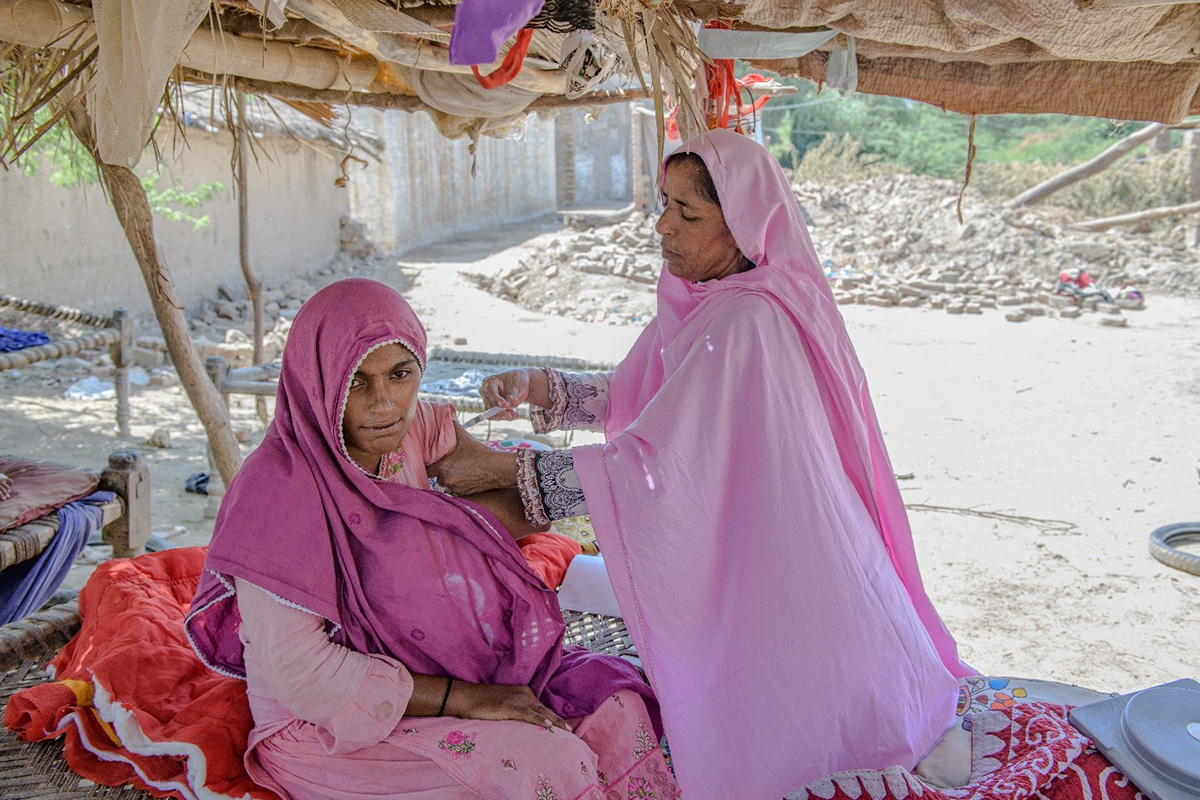 Fatima, a Lady Health Worker administering a tetanus-diptheria injection to a pregnant woman in a remote area of Sindh. Photo credit: WHO Pakistan3 April 2025, Islamabad, Pakistan – "Fatima is not just a health worker. She is an angel who brought light back into my life."
Fatima, a Lady Health Worker administering a tetanus-diptheria injection to a pregnant woman in a remote area of Sindh. Photo credit: WHO Pakistan3 April 2025, Islamabad, Pakistan – "Fatima is not just a health worker. She is an angel who brought light back into my life."
The words are Maloka’s, a young mother from a remote village in Tharparkar, Sindh province, who lost her first child to neonatal tetanus. When Maloka became pregnant again, Fatima, a Lady Health Worker, vaccinated her against tetanus, ensuring that both the mother and newborn would be protected.
Maloka’s story highlights how the Government of Pakistan, in partnership with the World Health Organization (WHO), has transformed the treatment of maternal neonatal tetanus (MNT) across the country. Around 80% of Pakistan’s population (190 million people) now live in areas where the spread of neonatal tetanus is under controlled limits – less than 1 case of tetanus per 1000 live births. Islamabad Capital Territory and Pakistan-administered Kashmir achieved elimination in March 2025, Sindh in December 2024 and Punjab in 2016.
Fatima, Maloka’s “angel”, is one of 17 000 Lady Health Workers deployed in the province of Sindh, and 30 000 across the country. For mothers like Maloka, Lady Health Workers are heroes, but they do not work alone. More than 140 000 Lady Health Visitors, Lady Health Supervisors, Lady Health Workers and midwives work across Pakistan, covering even the most remote areas, keeping mothers and newborns safe.
Maloka lost her first child, a baby girl, to neonatal tetanus. The pain of that loss fueled her determination to protect any future children. When Maloka became pregnant again, Fatima was there, a steady source of support and guidance. She ensured Maloka received the necessary tetanus vaccinations, advised her on safe delivery practices and provided antenatal care. Today, Maloka cradles her healthy 1-year-old son, a symbol of hope and resilience.
 Fatima administers a vaccine to a pregnant woman. Photo credit: WHO PakistanMaloka's story underscores the crucial role of frontline health workers like Fatima who provide advice from mother to mother. Fatima acts as a bridge between communities and the health care system, building trust and empowering women to take control of their health.
Fatima administers a vaccine to a pregnant woman. Photo credit: WHO PakistanMaloka's story underscores the crucial role of frontline health workers like Fatima who provide advice from mother to mother. Fatima acts as a bridge between communities and the health care system, building trust and empowering women to take control of their health.
Despite progress, Pakistan remains among 10 countries worldwide that have yet to eliminate MNT. In 2024, a total of 322 cases and 6 deaths were reported across the country, though WHO experts estimate that only 30% of cases are notified to the authorities.
WHO will continue to partner with Pakistan and its frontline health workers as they work to eliminate MNT from the country and protect future generations from this preventable disease.
As the sun sets over the Thar desert, casting long shadows across the sand dunes, health workers like Fatima are bringing hope for a healthier future to the most remote settlements. “Initially, it was an uphill battle,” Fatima recalls. “Many were hesitant, bound by traditional beliefs and misconceptions about vaccines. Now, the smiles of healthy babies and the relief in mothers' eyes are the greatest reward. It is a reminder that, even in the most challenging circumstances, we can make a difference, one vaccine at a time.”


